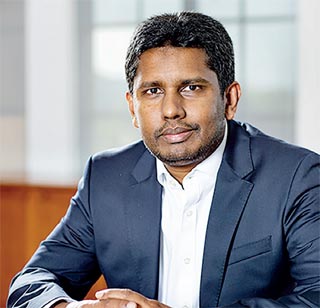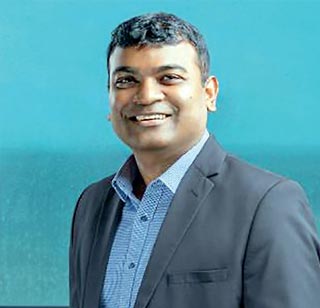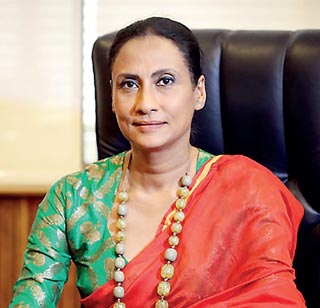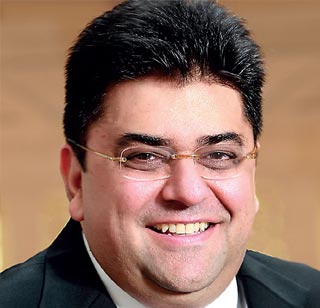Tuesday Feb 17, 2026
Tuesday Feb 17, 2026
Wednesday, 1 September 2021 01:06 - - {{hitsCtrl.values.hits}}
By Darshana AbayasinghaCIMA
 |
|
– LSEG Technology Co-Head Feroz Cader – |
 |
|
– Brandix Group Finance Director Hasitha Premarathna – |
 |
|
– SLTDA Chairperson Kimarli Fernando – |
 |
|
– Sensei International Founder Omar Khan – |
 |
|
– Asia Pacific Venkat Ramanan – |
Sri Lanka hosted a virtual APAC CIMA CXO forum last week titled ‘Navigating the tides of uncertainty’ featuring captains of several key Sri Lankan industries, detailing their outlook for this pandemic-blighted milieu.
Sri Lanka Tourism Development Authority (SLTDA) Chairperson Kimarli Fernando set the ball rolling detailing some of the developments within the industry, with new measures and actions to engage and educate all segments of the industry. She stressed the importance of better and effective communication for tourism coordination within this new normal, and pointed to digital portals that have been created by the Authority to achieve this end. Fernando asserted the existing tourism bio-bubble is working very well and had won praise from global stakeholders, which complements the actions of the Authority together with industry.
Keeping hopes alive
The SLTDA Chairperson stated many steps had been taken to try provide assistance to different segments of the tourism industry affected by the pandemic. “We have worked to keep the industry afloat, and create innovative spaces to do that in this new normal,” she said.
Accordingly, the agency has revisited its internal processes, infused technology for operations and also moved to reposition the Sri Lankan tourism product. The new tourism mobile application addresses a number of operational areas for operators and travellers alike. She revealed that SLTDA had reached out to funding agencies, in the absence of incomes, to roll out the agency’s first integrated global campaign in over a decade.
Another crucial area, she said, was to keep Sri Lanka alive in minds of travellers and agents, and the SLTDA has conducted several programmes online in this regard, with one such event drawing 24 million viewers globally. Fernando said she genuinely believes there is light at the end of the tunnel, with growing numbers in vaccination coupled with the announcement of Swiss Air and Air France commencing flights to Sri Lankan by the end of the year.
Tourism no threat
A question was posed as to how the Authority dealt with the anti-tourism lobby in the country, that charged tourists are bringing new variants and cases of COVID-19 into the country.
“Factually, we haven’t imported COVID-19 into Sri Lanka through tourism, because we have a tourism bio-bubble that is implemented. Anyone who does travel as a tourist is generally healthy and is coming following PCR tests, and there is also an insurance scheme which they must obtain from us. Now those are facts. It’s about the head and the heart and yes there can be a conflict. It is our responsibility to continuously engage with the community and educate them on our measures. Vaccination also helps, and more tourists are vaccinated. Because, they don’t want to come Sri Lanka and get COVID-19 here either. There are three million Sri Lankans depending on tourism, and they are wanting tourism to open. Look at the garment industry where everyone is sitting together inside a factory close together, but somehow that is not looked at negatively by Sri Lankans. They are more scared of tourists who are within a bio bubble. That’s unfortunate and there is a lot of work we are doing in this regard,” Fernando stated.
The SLTDA Chair predicted it would take Sri Lanka about two years to achieve pre-Easter attack levels of tourist footfall in the country, but once again stressed the importance of focusing on enhancing tourism yields than merely focusing on arrival numbers. She noted that traveller mindsets have changed and they are concerned for nature and wellness, and the SLTDA has taken a leaf out of this change and implemented a green building policy that anyone investing in tourism must abide with. This includes use of solar power, natural light, waste water control, etc.
She revealed the SLTDA is working with USAID to develop its own sustainability guidelines and accreditation, whereby the agency will promote hotels that are compliant. “I think the industry is also keen to do it, and the consumer is demanding it. We are looking to promote Sigiriya as the first sustainable destination in Sri Lanka, there will be zero plastic, augmented reality, disability access and so much more,” Fernando said.
Power with policies
Association of International Certified Professional Accountants Regional Vice President – Asia Pacific Venkat Ramanan pointed to the need for effective Government policies to overcome difficulties posed by the pandemic. He believes countries and governments that focus on policies to embrace and empower innovation during the time of the pandemic will reap bigger benefits at its end.
“Vietnam imposed a strict lockdown and gave support to people, but they went slow with vaccination. In India, look at the Reserve Bank of India (RBI). They had active intervention in the market with exchange rate management policy. Had the bank not intervened there would have been a gush of dollars into the market and the rupee would have sharply appreciated, whereby Indian exports would have been less competitive. Conversely, had the RBI not sold dollars when funds were being repatriated the rupee would have depreciated sharply, making imports more expensive. So, the policies have to be there as well. Governments need to look at foreign direct investment and expansion with technology. Look at the amount of fintech coming out of Vietnam, because the Government allowed it and that made changes to consumer behaviour. Governments and regulators should walk with the trend and encourage not just tax. South East Asia is a fast-growing digital economy that will take on the global stage because of the policies adopted by these countries coupled with mindset change. All of these things matter.”
Difficult to predict
Elaborating further on effective policies to counter the challenges posed by COVID-19, globally-renowned management consultant and Sensei International Founder Omar Khan remarked it was essential for both businesses and administrators to be highly flexible during the crisis and work towards meaningful outcomes. “There isn’t any single accepted solution to this as the world hasn’t had to time to react, because when we get to the other side of one wave another wave hits. The severity just depends on which country you are in and as to when on whether you are back into lockdowns. Accordingly, a right balance must be struck in terms of effective policy and action to safeguard public health and the economy,” he intimated.
“We have to be driven by value. What works. Years before, John Naisbitt said ‘a world of high-tech will be met with high-touch’. Less high-touch means every opportunity has to be magnified in terms of value, in terms of relevance and impact. Nobody will want go along sluggishly. So, we are defining a new dynamism. There are countries with high-infection and low mortality, so we have to keep our antenna up and our flexibility high. Everybody one wants to hear: ok we are done with COVID. It will come, but I don’t think we are there yet. We have to continue to be students of the situation. When you are in a challenge, you define it as something you will give up or something you get on with. We need to pick the frame that we will make this crisis meaningful, and that we will rinse out every inefficiency, everything that has passed itself by date and welcome innovation and more humanity. One definition of leadership is the value you add to your resources you are entrusted with. There is no gamebook with COVID.”
Cannot ignore economy
“We have to make one more shift. In the first wave we waited passively and lapped up what governments told us to do. One of the things I was shocked at was how quiet commercial voices have been. I know that’s credible, because you don’t want to interfere with medical professionals, but economic bankruptcy is not a medical strategy either. Poverty will kill you as conclusively as the virus. So, we have to realise that without sacrificing lives, and yet defending livelihoods, that we must offer our voices and imagination; never against what the government is trying to do but in constructive engagement and partnership, but not just to sit mute,” Khan stated.
He stressed on the need to work together to discover solutions and innovative means to overcome the multiple issues thrown up by the pandemic, and that it is imperative to realise everyone is experiencing troubled times. Get rid of everything you don’t need, as there is too much change going on to bear unnecessary weight. Now we need to really reimagine ourselves, he said.
A question was posed to Omar as to how businesses can be better aware of challenges and opportunities during the pandemic, to which he averred “we must realise we have to get a return out of the crisis”. The crisis is donation, so either it is wasted or you get a return out of it, he opined. Something we have to be aware of is mindfulness. Businesses and individuals must be strong enough to be weak to say I need help. If you are mindful of what you are going through, your clients, the world, the ecology is going through; then you have a chance to glimpse opportunity and possibility, he said.
Brandix Group Finance Director Hasitha Premaratne said the apparel industry bore some of the biggest shocks of the pandemic, as order books almost came down to zero. With sales orders and execution becoming a challenge, much of the local industry got into PPE, and the agility to move from one product to another very fast employing automation enabled to revive turnovers.
The industry understood the situation well, but faced significant challenges due to supply chain disruption. Accordingly, many companies opted to move the entire supply chain to one country or region to combat excessive costs with shipping, which had increased three-fold. This was a significant change to the operating model pushed by the pandemic, Premaratne revealed.
Responding to a question on increasing focus on Africa and Bangladesh for manufacturing operations viz Sri Lanka, Premaratne said: “That’s nothing new, the industry has been looking at new locations based on cost structures. We have been looking at automation to bring down costs on the people front, which is a huge component in the apparel industry. Productivity drive and automation is a big part of this. China’s apparel industry costs four or five time more than us, but they are still a $ 135 billion export business. Which means it’s not only about absolute cost but productivity. That is important. Not all the manufacturing happens in Sri Lanka, we use the subcontinent in particular as manufacturing destination so that broader supply chains are integrated, where we remain the hub. These are longer-term strategies. But with the rupee depreciating and current situation, in fact our competitiveness in Sri Lanka has held compared to many other destinations. That’s for the short-term, but it is not sustainable.”
Premaratne touched on the local apparel industry’s focus on sustainability and combatting climate change, adding that textile manufacturing has been identified as one of the biggest polluters, plus, yarn. The supply chain areas needed reform. He remarked that a two-pronged strategy was adopted to prevent and minimise emissions to the environment. “Recycling has come in in a big way, plus, the use of solar power. We know we can’t play with the environment. A lot of work is going into see how we can engage the wider stakeholders in this regard to make it more sustainable. Buyers are very conscious about what they wear and that they are sustainable. Technology has made things possible,” he said.
Mental strain on workers
Significant attention also fell on the mental health and well-being of employees as they adjust to the new normal of working from home, which has resulted in longer hours coupled with stress of uncertainty and more.
Ramanan presented employees across all categories and age groups must understand it is acceptable to feel vulnerable at this point, and moments of anxiety and uncertainty are normal. The environment we all operate in will remain uncertain for a while longer, which can prove troublesome for humans who love to be in control, he said. Organisations must find ways to engage more with people, understand them and provide necessary support.
“It’s important to say it is okay not to be okay. People often say stay strong, but why do you have to stay strong? Why can we not feel vulnerable? That cultural aspect of things we have been told in terms of resilience has to change, and when you need help seek it! We have this whole thing around ego and our personal brand that if someone is to know we are seeking help it is not good for us. Well, what’s not good for you then is you won’t last long. Seek help when help is needed, plus, ask the question ‘how can I help?’” Ramanan said.
Providing reassurance
Adding to the discussion, Omar Khan averred it is imperative we realise that this new normal is natural any more than the old normal was, and we simply need to define our spaces at work and at home.
“Home being the place you just woke up on Sundays and just blundered around and recuperated, and now you are going to create a productivity bubble and you want a space where you can focus and not intrude on that. Many people live intimately together and we need to help them to have these conversations. Anxiety and stress are major contributors to every illness, so we must do whatever we can to calm it down.”
LSEG Technology Co-Head Feroz Cader said health and well-being of team members is also connected to the resilience of a company’s technical operation and not have a single point of failure and security, he said, drawing parallels to his own firm. “If not, at times like this your teams will be scrambling all over the problems and it will become a day-to-day battle. So, if your systems are well thought through and are well invested in, that contributes towards the mental health and well-being of your teams. Organisations need to keep assuring teams that everything will be okay. You only gain by being over protective, by showing that you care about people’s livelihoods and well-being. Tell them we are in a marathon not a short sprint and that must be communicated and lived top down.”
Future models of working
The forum asked Cader on the impact of global operations such as LSEG, and if technical staff could continue to work from hope in a post-pandemic milieu. He revealed that LSEG was engaged with one of its largest projects when the pandemic broke, and staff were recalled immediately from project destinations. Numerous changes were made to the company’s operating model including larger investment in cloud-based systems, and worked around the many challenges. The company had to take on new tools and adjust to the new way of working immediately leveraging its core strengths in technology. “We were in technology, we had to take a lead.”
“For someone who operates in financial markets, the market determines where the talent will go. We should not come to a situation where tech-talent is available here in Sri Lanka and clients come here because it is a cheap resource. Any tech-company should be present here in Sri Lanka, not because it is cheap, but because it’s the best talent and happen to be a cost-efficient location. In tech you cannot limit new avenues of working and the location. The old model has changed. We are in a global environment and as an organisation you have to be on top of it or you end up losing your talent. However, from an innovation point of view, productivity can be lower when working from home. When you are together in person, you can see things in terms of spotting talent and ideas. So, it should be a mix that we carry into the future, but it is still too premature to say,” Cader responded.